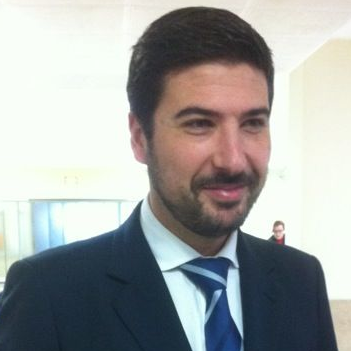A stress-awareness approach to safer decision making in the trading process integrating biometric sensor technology
On Jan 21st, 2013, Alejandro Fernández-Montes González defended his Ph.D. dissertation at Universidad de Sevilla, Spain, entitled; “Energy Saving Policies in Grid Computing and Smart Environment". A great part of the research was funded by Spanish Ministry of Education under the project ARTEMISA (TIN2009-14378-C02-01). Alejandro defended his dissertation in a publicly open ceremony held in the Universidad de Sevilla, and was able to comment on every question raised by the assessing committee. The thesis was supervised by Prof. Dr. Juan Antonio Ortega and co-supervised by Prof. Dr. Luis González. An important part of this research was carried out during his stages at Universidad Carlos III de Madrid, supervised by Dr. Natividad Martinez and Dr. Ralf Seepold and at Ecole Normale Superiore de Lyon supervised by Dr. Laurent Lefevré.
The thesis has been read and approved by the assessing committee which included Prof. Dr. Miguel Toro, Prof. Dr. Mario Piattini, Prof. Dr. Nieves Rodriguez, Prof. Dr. Ralf Seepold and Prof.Dr. Antonio Ruiz, all present at the ceremony.
Thesis Summary:
This thesis, presented as a set of research papers, studies the problem of energy consumption growth in two spheres: Grid-Computing and Smart Environments. These problems are tackled through the establishment of energy-saving policies developed for each environment in order to save the maximum energy as possible.
In the Grid-Computing environment, seven energy-policies were designed in an attemp to minimize energy consumption through shutting resources down and booting them. These energy policies were tested by applying usage data from French Grid'5000 infrastructure and a simulation software tool developed specifically for this purpose. In general, it is proven that around 30\% of energy can be saved. The software tool, called Grid'5000 Toolbox, can simulate the behaviour of a Grid-Computing environment, whilst applying several energy policies, and can compute statistics such as energy consumption, usage, and the states of resources and can generate dynamic graphical representation of the state of the jobs deployed and that of the resources.

In Smart Environments where sensors perceive lighting conditions, the energy-saving policy adjusts lighting in order to satisfy user preferences and prevents energy from being wasted. A set of wireless sensors were deployed on two offices at the department of Computer Languages and Systems. This set of sensors is comprised of a mesh network through which the sensors interact in order to retrieve information about lighting, and air conditioning, whereby this information is sent to a central node. The dataset created over several months was employed to extract information about user lighting preferences, from the application of which it is proven that around 70\% of energy can be saved in lighting appliances.

